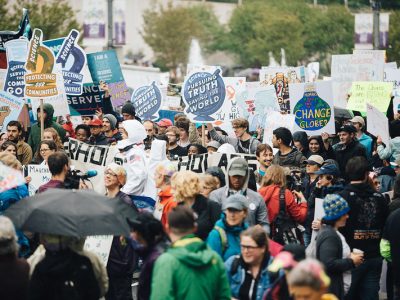 Today, on behalf of 100 environmental and administrative law professors affiliated with 70 universities in 33 states and the District of Columbia, Sean Hecht and I filed a comment letter urging EPA to withdraw its updated proposal to limit the use of science in agency decisionmaking processes, misleadingly named the “Strengthening Transparency in Science” rule. …
Today, on behalf of 100 environmental and administrative law professors affiliated with 70 universities in 33 states and the District of Columbia, Sean Hecht and I filed a comment letter urging EPA to withdraw its updated proposal to limit the use of science in agency decisionmaking processes, misleadingly named the “Strengthening Transparency in Science” rule. …
Continue reading "100 Law Professors Urge EPA to Withdraw Revamped “Transparency in Science” Rule"
The post 100 Law Professors Urge EPA to Withdraw Revamped “Transparency in Science” Rule appeared first on Legal Planet.
#thedistrict #administrativelaw
Today, on behalf of 100 environmental and administrative law professors affiliated with 70 universities in 33 states and the District of Columbia, Sean Hecht and I filed a comment letter urging EPA to withdraw its updated proposal to limit the use of science in agency decisionmaking processes, misleadingly named the “Strengthening Transparency in Science” rule.
Under the auspices of promoting increased transparency, the proposed rule would make sweeping changes to the way that EPA uses science in regulatory decisionmaking processes. More specifically, the rule, as written, would foreclose EPA’s ability to rely on important peer-reviewed scientific studies that inform key environmental protections, like safe drinking water standards and pesticide regulations, where the underlying data supporting those studies are not publicly available.
Announced this March, the supplemental proposal follows on EPA’s 2018 proposed rule, which we joined a number of law professors, scientists, and others in opposing. The revised proposal significantly broadens the reach of the rule, making it hard to imagine EPA could take, or contemplate taking, most significant regulatory or policy actions without being constrained in its ability to consider important scientific research. The resulting costs to public health and safety will be serious.
EPA has now expanded the proposed rule to capture nearly all science the agency considers—while still exempting without explanation agency adjudications and enforcement activities, where science based on non-public data could ostensibly benefit regulated entities. EPA claims to respond to patient privacy and trade secret concerns raised by the initial proposal by allowing for the consideration of studies when “tiered access” to data is granted to authorized researchers, rather than the general public. But this concept is inconsistent with the reality of contractual agreements with research subjects, and will be infeasible or impossible to implement in a way that allows the agency to utilize the highest-quality science as it sets policy. As an “alternative,” EPA proposes an approach that would, if adopted, allow EPA to consider studies based on non-publicly available data under certain circumstances. But this proposed alternative implementation—weighing studies based on non-public data less heavily than those based on public data—bears no relationship to widely-accepted principles and procedures of scientific review.
In addition to these substantive issues, as Sean has written, EPA continues to lack authority to promulgate the rule in the first place. Because EPA initially relied on environmental statutes that did not grant authority for this rulemaking, EPA has now modified its proposal to draw authority from the federal Housekeeping Statute. But that statute doesn’t appear to apply to EPA, and even if it did, it is well-settled that substantive rules like this one, which stand to significantly modify the way the agency does business, do not fall within its ambit.
The supplemental rule strikes at the very heart of EPA’s mission, in clear contravention of EPA’s authorizing statutes. EPA cannot discharge its legal obligations to consider the best science in the name of protecting public health and the environment if controlled by this rule’s limitations. Recent events have shown us what can happen when the government is hostile to scientific knowledge; we cannot afford for EPA to use this rule to lock in an anti-science approach for years to come. Because transparency is an important value, the agency should withdraw this proposal and work productively with members of the scientific and legal community—many of whom have thought deeply about these issues—to advance transparency goals in a way that respects existing federal law.
The post 100 Law Professors Urge EPA to Withdraw Revamped “Transparency in Science” Rule appeared first on Legal Planet.
By: Julia Stein
Title: 100 Law Professors Urge EPA to Withdraw Revamped “Transparency in Science” Rule
Sourced From: legal-planet.org/2020/05/18/100-law-professors-urge-epa-to-withdraw-revamped-transparency-in-science-rule/
Published Date: Mon, 18 May 2020 15:17:33 +0000
Vist Maida on Social Me
Website Links
Maida Law Firm - Auto Accident Attorneys of Houston, by fuseology
No comments:
Post a Comment